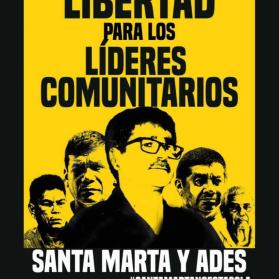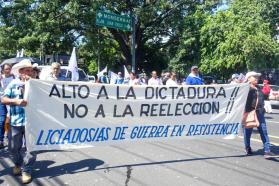Elections Update: Supreme Court Rulings Stoke Frustration and Cynicism as Elections Approach
Election season is in full swing in El Salvador, as candidates and political parties hold rallies and prepare for legislative and municipal elections on March 4. During its three-year term, the incoming legislature will appoint new Supreme Court magistrates and a new Attorney General, as well as consider competing proposals from the right and the left on critical issues such as water privatization, national spending and reproductive rights. The outcome will set the stage for fast-approaching presidential elections in early 2019.
Though the pre-electoral period has been relatively calm, social movement organizations are concerned that the Constitutional Chamber of the Supreme Court could play a destabilizing role in the weeks and months to come. Political parties, especially the governing leftist Farabundo Martí National Liberation Front (FMLN), are also fighting an uphill battle against cynicism and apathy that opposition candidates are deliberately stoking.
El Salvador’s electoral system, developed out of the 1992 Peace Accords, can be considered a successful model of transition from armed conflict to a representative democracy. But the right-wing elite, determined to break the power of the FMLN after its historic 2009 presidential victory, has moved to change the rules of the game, often relying on the judicial system to do so. The Constitutional Chamber of the Supreme Court, which the right-wing majority legislature elected in 2008, has dramatically re-shaped El Salvador’s electoral system, from the ballots themselves to who oversees the elections. As current president of the Supreme Electoral Tribunal, Julio Olivo, recently summarized, “A new system of voting has been imposed by judicial sentence, outside of any political consensus between the national actors and outside of the opinion of the citizens whose free exercise of suffrage has been complicated.”
Election Day Uncertainty
A chamber ruling from 2015 that will be implemented for the first time on March 4 threatens to cause delays and problems. The ruling concerned the Vote Collection Councils (Juntas Receptora de Voto or JRVs), the volunteers responsible for counting and verifying votes. In each polling place, usually a school or a community center, the names of eligible voters are divided into lists spread out across many tables. At each table, five volunteers, each of whom has a substitute, form the JRV, charged with registering voters and carrying out a system of checks and balances meant to confirm their identity and that each person can only vote once. Each of the three political parties that won the most votes in the last election is responsible for mobilizing volunteers to join the JRVs, the idea being that each JRV would have representation from multiple political parties in order to guarantee oversight of the process as a whole.
However, on July 24th, 2015, the Constitutional Chamber ruled that no one who was a member of a political party would be permitted to serve on a JRV, nor would anyone who had ever been a member of a political party. For the 2018 election, the Supreme Electoral Tribunal (TSE) determined that 9,422 JRVs would be formed, requiring over 94,000 volunteers. While the parties were still required to mobilize people to serve on the JRVs, they were unable to turn to their experienced volunteers; in the end, the parties were not able to recruit enough candidates who met the Chamber’s requirements. TSE President Olivo reported, “With those proposed by the parties, we covered 70% of the JRVs, after verifying that no one had any affiliation with a political party. Then it is up to the TSE to resolve all the problems and barriers that the [Constitutional] Chamber throws up.”
The TSE was forced to randomly enlist people to serve on the JRVs in a process much like jury duty in the United States. In order to compel the enlisted citizens to serve on the JRVs, the TSE has announced that it will fine those who do not show up $100, around one third of the monthly minimum wage. The process has been marked by confusion and frustration as many of those chosen to serve on the JRVs have applied for exemptions, which the TSE has then had to sort through and judge.
The chamber’s ruling has prompted concerns that people with little to no experience will be staffing the polling places. But more significantly, it undermines the concept that each political party should have representation at each polling place, which has been a fundamental principle of democratic system El Salvador developed coming out of the Peace Accords.
This kind of consistent meddling and undermining of El Salvador's electoral system has likely been a contributing factor to a growing sense within the population of both apathy and lack of confidence in the political process. A recent poll conducted by the University of Central America’s Institute for Public Opinion (IUDOP) asked respondents about their level of confidence in the upcoming electoral process, to which 46.4% answered “little” and 28.4% answered “none.”
Since 2008, when the Constitutional Chamber started its ten-year term, it has continuously moved to weaken the strength and scope of participation of the country’s political parties. Many consider the Chamber’s actions to be part of a broader right-wing strategy to put the brakes on the FMLN’s momentum and to disarticulate the voting bloc who brought them to power after twenty years of right-wing rule by the Republican Nationalist Alliance (ARENA).
For example, under the guise of “independence” and “citizen participation,” the right has promoted the rise of independent candidates, unaccountable to any party or political project. Disregarding an explicit statement in the Constitution that the only way to access political power in the country is through a political party, the Chamber ruled in 2010 that independent candidates could participate in legislative elections. Thus far, independent candidates are only allowed to run for legislative deputy, not for mayor or for President, and while political parties have continued to dominate the electoral process, the sands are quickly shifting.
A “New” Challenge from the Right
As if taking his cue from the Supreme Court’s moves to push for independent candidates, this election season has been defined by the actions of someone who isn’t even running, the outgoing mayor of San Salvador, Nayib Bukele, formerly of the FMLN. An ambitious millionaire, Bukele’s aspirations to become the FMLN’s 2019 presidential candidate was no secret. When it became clear that this would not come to pass, the conflict between him and the party became increasingly dysfunctional, reaching its limit last year when he threw an apple at an FMLN city councilmember and called her a witch. He was subsequently expelled from the party and has since founded his own “political movement” called New Ideas.
He has been outspoken in denouncing all political parties as corrupt and has called for Salvadorans not to participate in the upcoming legislative and municipal elections. In January he told a group of supporters “I want to ask you to do the following: in the next election in March, New Ideas [Bukele's new political group] will not be on the ballot. Don't vote and if you are feeling lazy just stay at home watching television.” While his calls to abstain are a naked attempt to push his own political agenda of running for President in 2019, they also fit neatly into an ongoing right-wing narrative aimed at demobilizing the population.
This narrative, often supported by US government actors, has tarred the FMLN government as corrupt, despite the absence of any such charges against any current government official, and sought to discourage people from political participation. As CISPES outlined in this 2015 article, the right-wing, with US support, has pushed a narrative that portrays all political parties as corrupt and has called for the establishment of an international anti-corruption body similar to Guatemala and Honduras in order to undermine the popularity of the elected government. The anti-corruption drive has less to do with rooting out actual corruption and more to do with undermining the legitimacy of the government.
It seems this narrative has gained some amount of traction, undermining people's confidence not just in the political parties, but also in the democratic system itself. As part of the IUDOP poll, when asked how much elections express the will of the people, 61.8% of respondents replied “little or none.”
The same poll has shown that nationally, the right-wing ARENA party holds the lead heading into the March 4 election, with 32.7% of respondents supporting, while the FMLN had the support of 20.5%. However, legislative and municipal elections tend to be much more defined by local issues, so national polling can be hard to translate.
In important race for mayor of San Salvador FMLN candidate Jackeline Rivera faces ARENA candidate Ernesto Muyshondt. Though Muyshondt is widely regarded as a weak and discredited candidate who is perhaps most notorious for having negotiated for electoral support for ARENA from gang leaders, the IUDOP poll gives him the advantage, 27.1% to 24%. His lead over Rivera, a Legislative Deputy from the Cuscatlán Department, probably owes more to Bukele's active anti-FMLN campaign than to his own popularity. In fact, the IUDOP poll showed that the leading answer (29.5% of respondents) as to who is the best candidate for Mayor of San Salvador was “none.”



